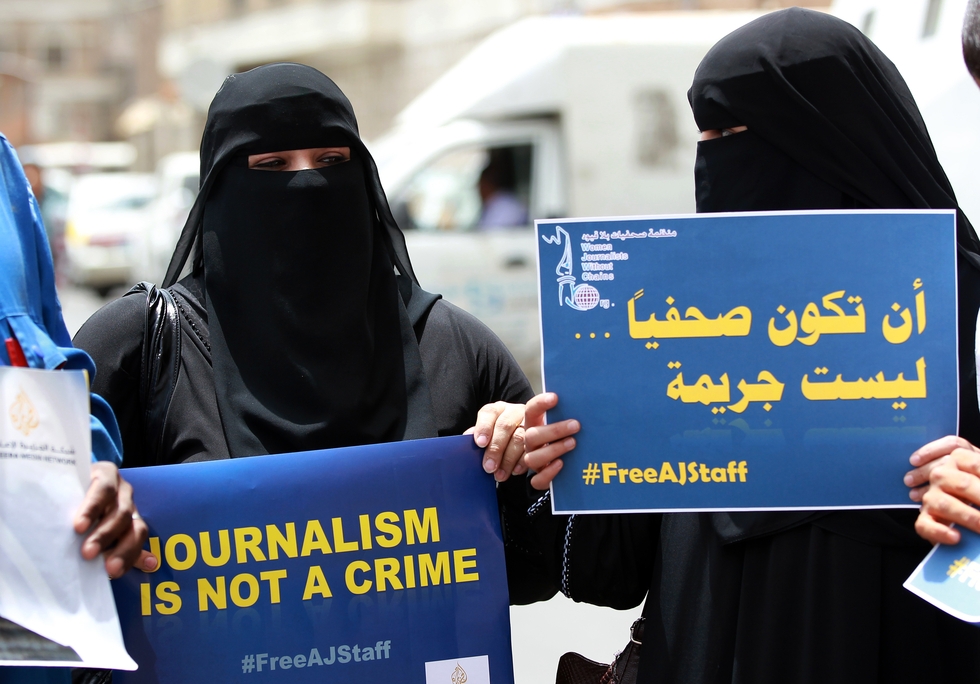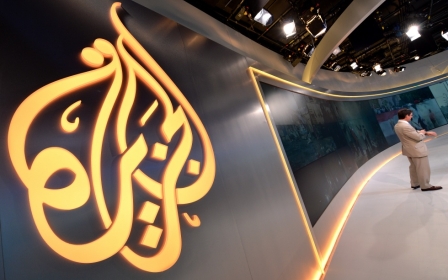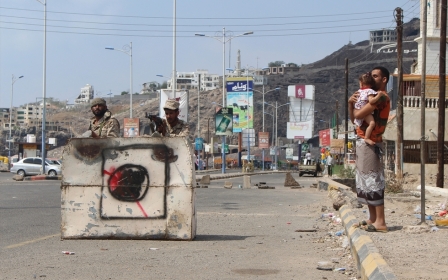Journalists covering Yemen war targeted by all sides

TAIZ, Yemen - Three Al Jazeera Arabic crew members went missing on 18 January while they were on their way back to their house in the al-Masbah area in the centre of Taiz city, which is completely under the control of the Popular Resistance.
Al Jazeera correspondent Hamdi al-Bokari and his crew, photographer Abdulaziz al-Sabri and driver Moneer al-Sabai, are believed to have been kidnapped by a group of Popular Resistance fighters.
A friend of Bokari, who worked with him as a photographer, told Middle East Eye on the condition of anonymity that Bokari and his colleagues were kidnapped around 10pm after having dinner at the house of Abdulstar al-Shamiri, a leader in the Resistance.
"All of us know that the al-Masbah area is far from the Houthis and this area is completely under the control of the Resistance, so the Houthis are innocent of this abduction. The Resistance is the only group responsible for this abduction," Bokari's friend added.
He said that there are more than 10 groups fighting with the Resistance in Taiz, including Salafi fighters and alleged members of al-Qaeda in the Arabian Peninsula (AQAP). The leadership of the Resistance cannot control all of these groups, he added.
New MEE newsletter: Jerusalem Dispatch
Sign up to get the latest insights and analysis on Israel-Palestine, alongside Turkey Unpacked and other MEE newsletters
"There are disputes starting to emerge among the different groups of the Resistance in Taiz, and this threatens the future of Taiz in general and the journalists in particular, as the different groups will resort to kidnapping journalists and activists, who are under the protection of the leadership of the Resistance," Bokari's friend told MEE.
The Al Jazeera Media Network has called for the immediate release of the news team, but the news channel did not accuse any side of the abduction.
The news channel said in a statement on Thursday that there were "indications that Bokari had been kidnapped by unknown persons".
Sleeper cells
No one has claimed responsibility for the abduction yet, and the Resistance of Taiz province said that there are sleeper cells of former president Ali Abdullah Saleh inside Taiz.
Moaath al-Yaseri, a leader of the Popular Resistance in Taiz, said that Saleh had resorted to using his sleeper cells to defame the reputation of the Resistance, after being unable to take over Taiz.
"Al Jazeera crew members were kidnapped by the sleeper cells of Saleh, which have spread in the areas of the Resistance in Taiz, but the Resistance is following the issue now and we will not let the abductors flee," he added to MEE.
Yaseri stated that the Resistance is happy with the work of Al Jazeera Arabic in Taiz, confirming that the Resistance does not have any interest in kidnapping the journalists, as journalists in Taiz often reflect on the suffering of the residents and highlight the siege on the city by the Houthis.
However, the Yemeni Journalists Syndicate (YJS) said that the leadership of the Popular Resistance of Taiz is responsible for the abduction of Bokari and his colleagues given that they were abducted from an area under its control.
"Even if the Resistance did not abduct the Al Jazeera crew members, the Resistance is responsible for the al-Masbah area, and it has to keep it safe and protect the residents of that area," said Ashraf al-Rifi, the secretary of YJS’s rights and freedoms committee.
There are 13 journalists still detained by the Houthis and by al-Qaeda, according to YJS, which called for their immediate release.
There were no reports of the Resistance kidnapping or arresting any journalists last year.
Fears among journalists
When the Houthis in 2014 took over the capital, Sanaa, they arrested many journalists who were opposed to them. In response, many journalists fled to other provinces, including Taiz.
However, the abduction of the Al Jazeera team has created fear among journalists in Taiz, as this was the first abduction of journalists in an area controlled by the Resistance in Taiz, and some journalists have been considering leaving the city.
Fareed al-Homaid, a freelance journalist based in Taiz who used to work for the Yemen Times newspaper, said that he fled Sanaa in April 2015, and he is thinking now about fleeing Taiz to another province, as Taiz seems not to be safe anymore for journalists.
"In Sanaa, we know that the Houthis abduct journalists, but in Taiz we do not know which group of the Resistance is responsible for the abduction, so the abductor is anonymous and this is very dangerous," Homaid told MEE.
He added that he feared journalists would be victims of disputes between various groups of the Resistance in Taiz, confirming that he had become very cautious about his movements throughout the city.
Homaid condemned the leadership of the Resistance for its attitude towards the abduction of Al Jazeera crew members.
“The leadership of the Resistance accused sleeper cells of former president Saleh for (carrying out) the abduction, but the Resistance has not looked for the abductees in Taiz city."
He said that even if Saleh's sleeper cells kidnapped the Al Jazeera team, the sleeper cells could not take them out of Taiz city, as the checkpoints of the Resistance have spread around the entire al-Masbah area and the surrounding areas, so he believes that the Resistance is the only one responsible for any journalist abductions in Taiz city.
On Saturday, crowds of residents in Taiz protested in solidarity with the Al Jazeera team, holding photos of the abductees and calling for their immediate release.
Middle East Eye delivers independent and unrivalled coverage and analysis of the Middle East, North Africa and beyond. To learn more about republishing this content and the associated fees, please fill out this form. More about MEE can be found here.




